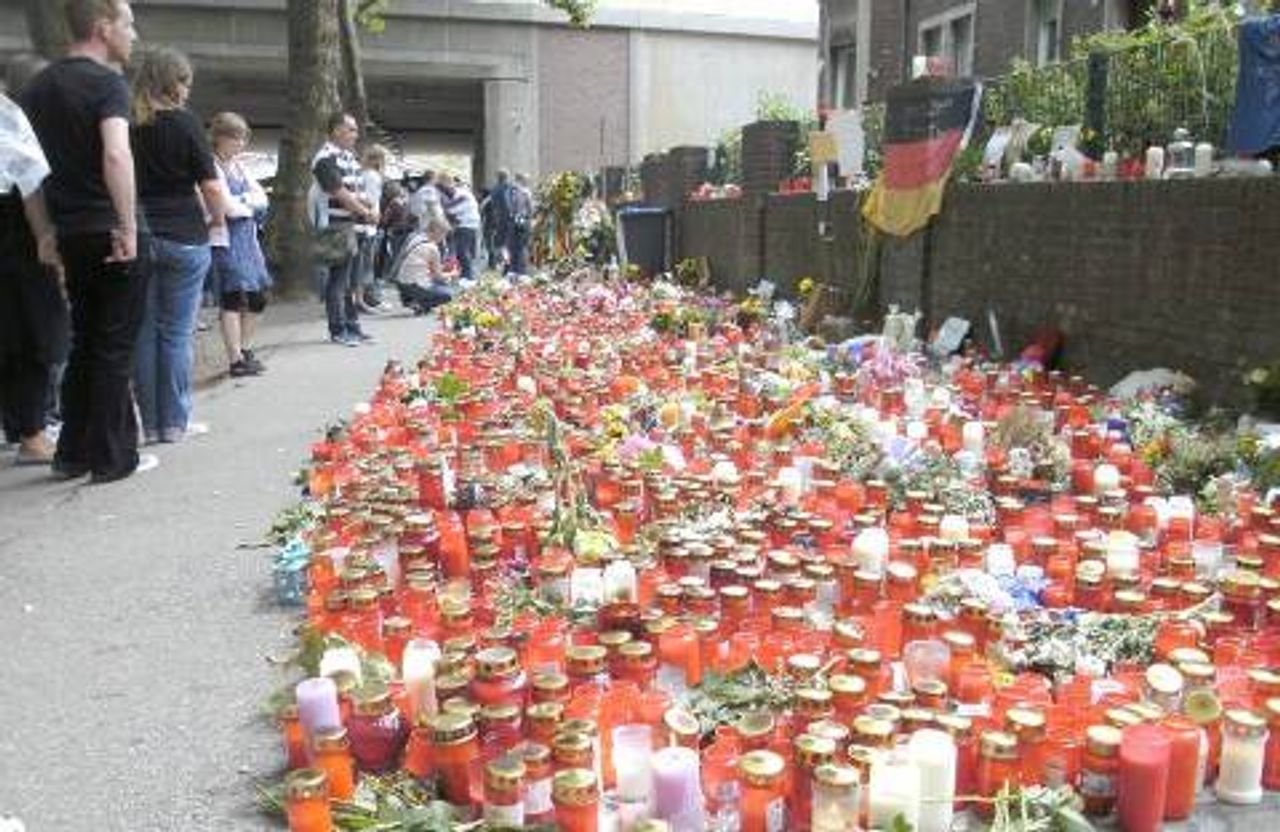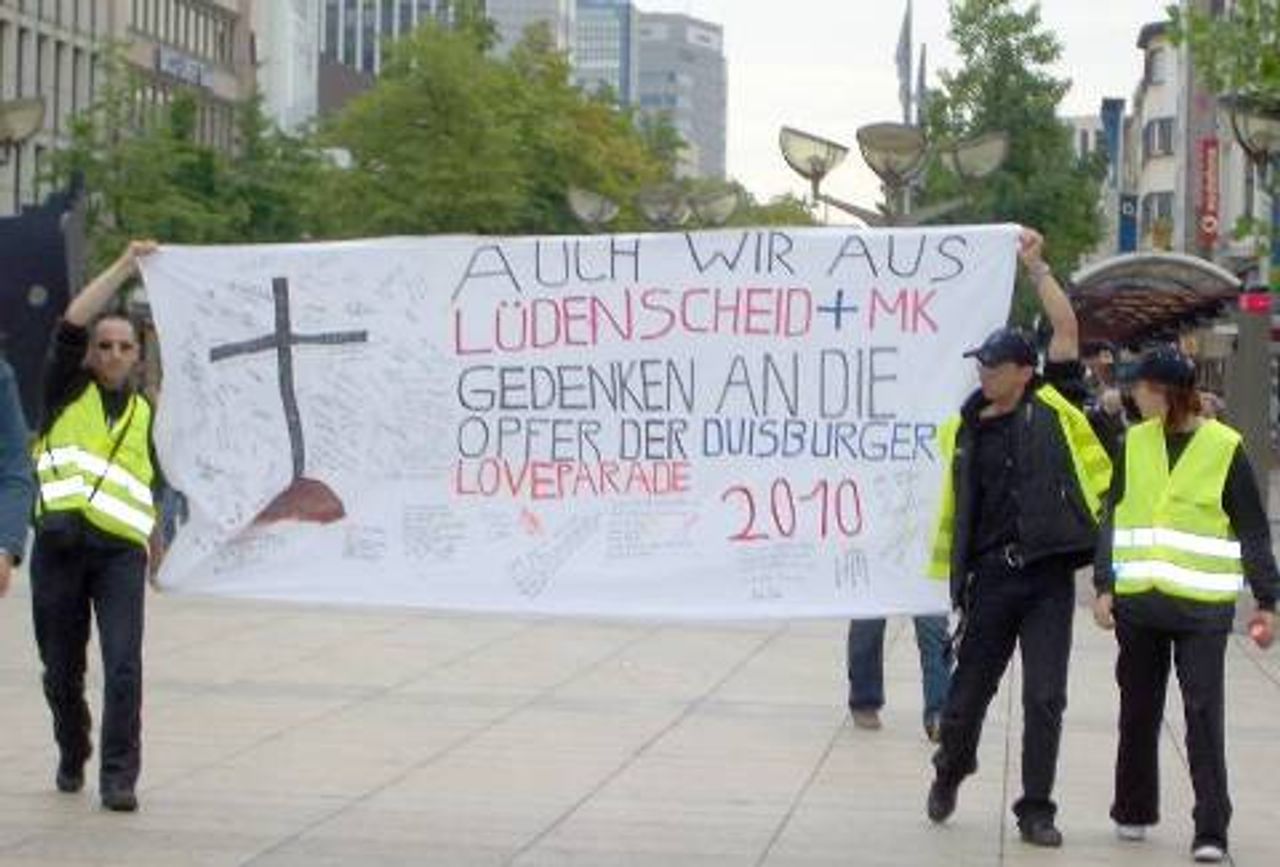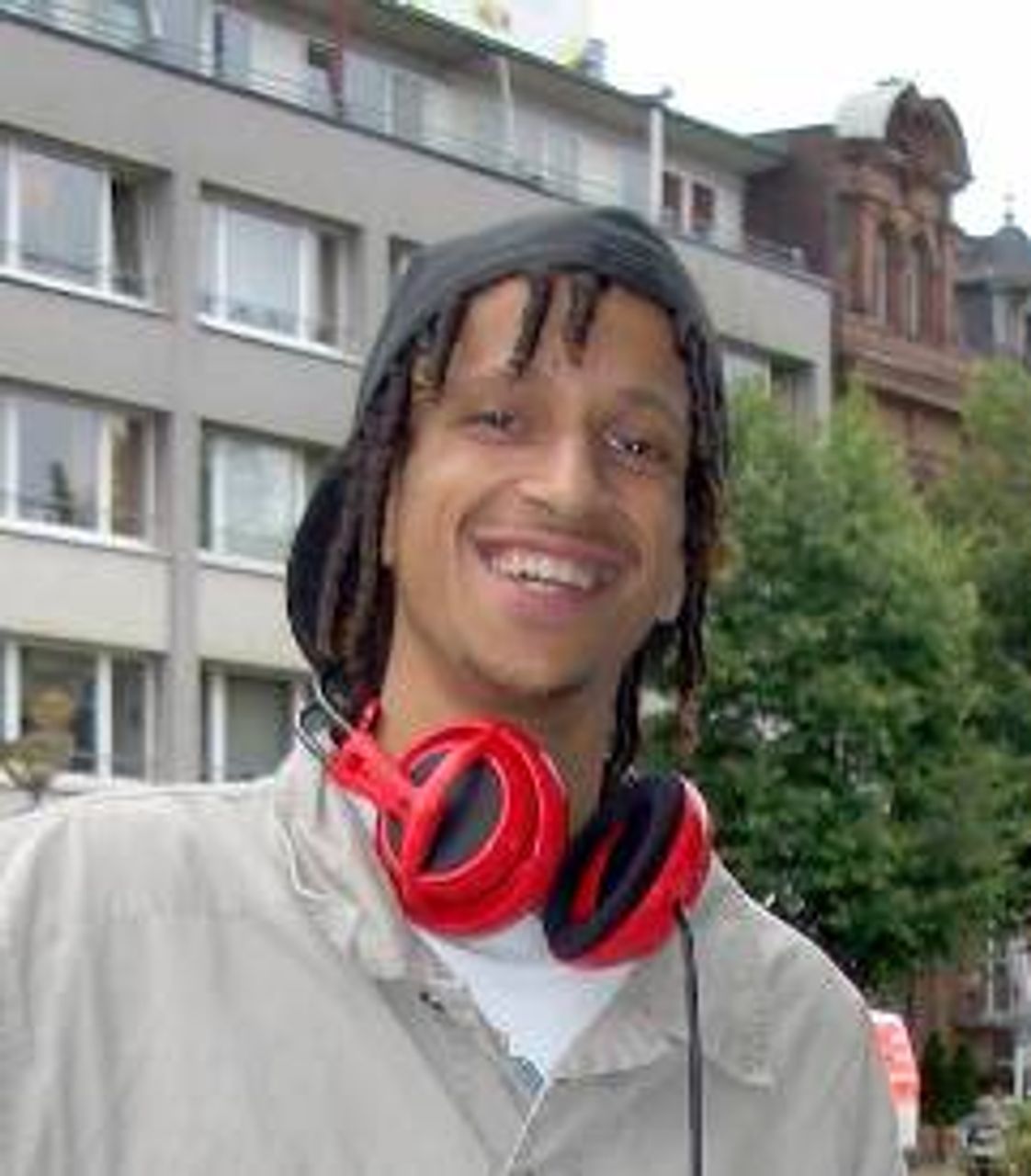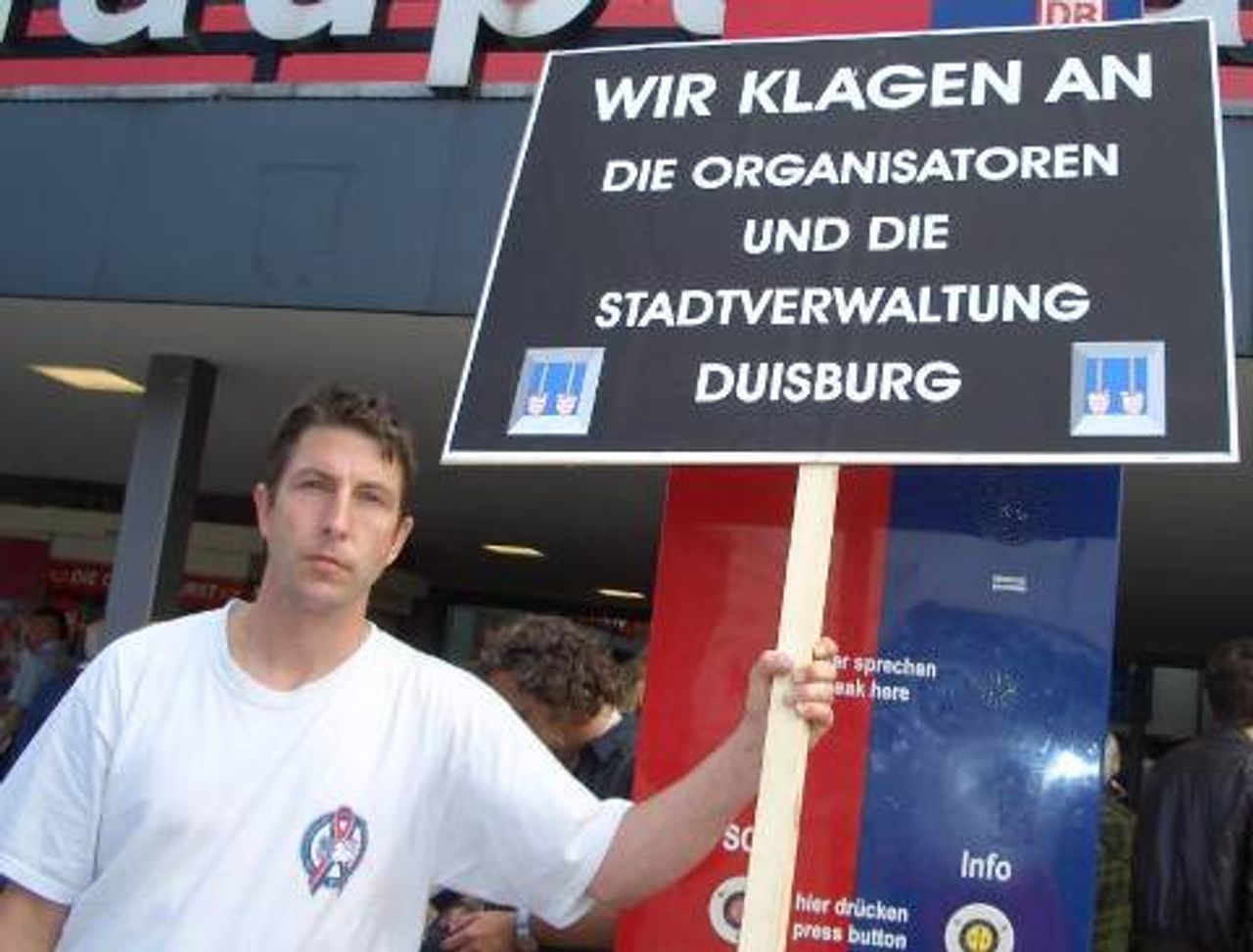The official funeral service for the victims of last Saturday’s Love Parade techno music festival in Duisburg was dominated by national and state political figures and evoked only minimal interest amongst the population at large.
 Mourners at the tunnel
Mourners at the tunnelAcross the city, at the site of the catastrophe where 21 young people were crushed to death and over 500 injured, thousands gathered to pay their respects to the victims.
Amongst those taking part in the official funeral service at the Salvator Church were German Chancellor Angela Merkel, federal President Christian Wulf, President of the Bundestag Norbert Lammert (all from the Christian Democratic Party, CDU) and Foreign Minister Guido Westerwelle (Free Democratic Party). Hannelore Kraft (Social Democratic Party SPD), prime minister of the state of North Rhine-Westphalia, gave the main speech at the church service.
The Salvator Church and nearby city hall were cordoned off from the general population by barriers manned by a strong police presence. A top security level one prevailed. Initial plans to allow the funeral to be transmitted via giant screens set up in front of the church as well as in the city center were cancelled at short notice. Instead a transmission was made to the MSV sports arena situated several kilometers away.
Official sources had anticipated that tens of thousands would attend the event. In fact only a few thousand turned out. Attendance in the Salvator Church was restricted to politicians, police, representatives of the media, aid and rescue forces and relatives of the victims. In the MSV arena, with room for 30,000 visitors only 1,500-2,000 turned out to watch the funeral services on large screens. Thousands of police were posted in the stadium and at Duisburg’s main railway station.
Anyone attending the ceremony outside the city hall and church could have easily had the impression that the aim of the politicians in attendance was not to mourn alongside the population. Instead they seemed fearful of any mass participation. The two main figures behind the Love Parade, the mayor of Duisburg, Adolf Sauerland (CDU), and its organizer Rainer Schaller, did not attend the funeral service stating that they “did not want to provoke the relatives of the victims by their presence”.
On Saturday participants at the Love Parade and friends of the victims organized their own funeral march from the Duisburg main station to the tunnel where the disaster took place. Since the tragedy, the entrance to the tunnel has become the central site for those mourning the victims. Thousands came to the tunnel last week in order to commemorate the dead and obtain some idea of what had taken place.
The area in front of the tunnel is covered with thousands of candles, flowers, photos and messages angrily criticizing those responsible for the disaster and demanding that they be held to account.
The uncovering of new facts reinforces the opinion that the Love Parade disaster in Duisburg was not a tragic misfortune but instead entirely preventable. It is increasingly clear that the greed for profits and prestige was the main driving force for the organizers and sponsors of the festival, rather than the security and the well-being of the hundreds of thousands of young people who merely wanted to celebrate and enjoy music together.
The events in Duisburg must be seen in connection with a number of other avoidable disasters that have taken place as a result of the drive for profit, a lack of public investment and the indifference by politicians for the population at large. Recent comparable incidents in Germany include the collapse of the building housing the Cologne city archives at the start of 2009 due to subway construction, costing the lives of two people and destroying irreplaceable historical documents, as well as the collapse of the roof of the ice-skating hall in Bad Reichenhall in 2006, which killed 15 children, young people and adults.
On Friday the regional WAZ newspaper published excerpts from a document from the operational headquarters of the fire brigade that lays considerable blame for the Duisburg disaster on the police. Police in attendance at the festival closed the main entrance to the Love Parade between two tunnels and the meeting area despite opposition from the fire brigade. The closure of the entrance contributed to the jam of people, which led to an outbreak of mass panic.
Due to a communication breakdown and other problems people continued streaming into the tunnel although the only exit was blocked. Participants were caught in a trap from which there was no escape. The fire brigade had anticipated such an eventuality and had criticized the blocking of this entrance as “very problematic”.
So far the role of the police has been subject to little critical examination. Instead, prominent representatives of the police trade union have gone on the offensive giving interviews to the media and operating as quasi spokespersons for the police. Together with the NRW interior minister, Ralf Jäger (SPD), they have sought to protect the police.
Reporters from the World Socialist Web Site spoke with mourners who had decided to attend the funeral service in the city and had gathered at the police barriers. WSWS supporters distributed a leaflet titled “The Love Parade disaster: not a tragedy, but a crime”, which was read widely by those attending the official funeral service as well as by mourners at the tunnel.
 Mike Danielzik, left, holding a banner commemorating the victims
Mike Danielzik, left, holding a banner commemorating the victimsMike Danielzik from nearby Lüdenschied took part in the Love Parade. He had been able to reach the central festival area and thereby avoid the fatal crush of people at the tunnel. He was angry that those in a position of responsibility had ignored so many warnings for weeks.
“There had been warnings for weeks from all sides”, Mike said. “[From] the fire brigade in Dortmund, the police in Berlin, who had also been mobilized for the festival. Additional warnings came from the police and emergency services in Essen. It is appalling that these warnings were ignored and the decision made that the Love Parade should nevertheless take place in Duisburg”.
“Every dead person, every injured person is one too many”, he declared. “You cannot lock up 800,000 people like cattle. There were also fences set up everywhere on the main festival area. That was not necessary. The fact that just one site was chosen as both entry and exit is incomprehensible. The whole thing should not have been permitted…. The disaster was bound to happen”.
Marinella from France, who had also attended the Love Parade together with her daughter, husband and her friend Marlène, criticized the action of the police in closing off the entrance at a critical time. “It might have been possible to avoid the disaster if the police had not set up a barrier”, she declared.
“We were lucky that our daughter was there”, she said. “She is just seven years old. I did not want to take part in the parade, but we were pushed in whether we wanted to or not. We could not move either to the left or right. People next to me said, ‘You have to leave with your child’. She was my main concern. I said to a policewoman, ‘I have to get out with my child’, and eventually she let us out, but we were then immediately blocked in again. The blockade undoubtedly was a major contributing factor to the tragedy. They should not have done it that way”.
 Fabiano Pereira Silva
Fabiano Pereira SilvaFabiano Pereira Silva, 25, from Dortmund, had also made it to the central festival area of the Love Parade. He then watched how the catastrophe developed at the tunnel.
“I could not get down to help without risking my own life”, he said. “I could only look on as it happened. It was simply terrible to see the crowd being crushed. I can hardly put it into words. It was a disaster”.
When asked about the causes, Fabiano said, “Very simply: Money! I am not the only one who says this. When someone organizes such a gathering then it has to be done properly. In my opinion, people died because of the irresponsibility of those who organized the festival. They died because of money and nothing else. If they had had enough money they would have used the other entrance that was reserved for VIPs. There is, in fact, enough space in Duisburg. Why was it necessary to force those who wanted to attend the festival to pass through a tunnel?”
The victims were young people who wanted to celebrate and release their frustrations, Fabiano said. “It could just as well have been me. I could also be dead now. The young people, who died were educated; they were not fools. They had their lives before them”.
 Markus in front of the Duisburg main station. Poster reads: “We accuse the organizers and the Duisburg City Council”
Markus in front of the Duisburg main station. Poster reads: “We accuse the organizers and the Duisburg City Council”Markus had traveled from Kaiserslautern and took part in the unofficial funeral march. “What happened here cannot remain unpunished”, he said. “The city administration and the supervisors must be made accountable. The supervisors underestimated the whole event. When one has a restaurant with 15 seats, then you cannot invite 50 people to attend a lunch. This can’t be done.
“What happened here is a crime. Ordinary citizens can be locked up for minor offenses. For me the big question is why the supervisors were not taken into detention. Many people died here or were severely injured, but nothing happens. Now everyone wants to make sure that nothing is hushed up. That is why I am here, and out of solidarity.”
